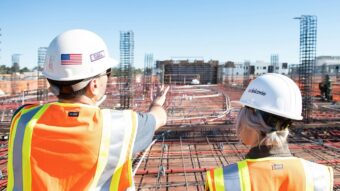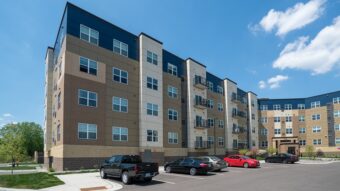 The following is a guest post from the Chicago chapter of CoreNet Global.
The following is a guest post from the Chicago chapter of CoreNet Global.
Uncertainty. That’s the best word to describe both the Federal Reserve Bank of Chicago’s national and local economic forecasts delivered Jan. 10 to the Chicago Chapter of CoreNet Global. Both reports pointed to a year of uncertainty for commercial real estate professionals in 2013.
During the Chicago Fed presenation to CoreNet officials, senior economists William Strauss and Rick Mattoon admitted that their crystal balls were a bit cloudier this year. Nationally, much of the uncertainty comes from the temporary fix to avert the so-called “fiscal cliff,” a problem that will return this spring. Meanwhile, Chicago continues to labor under the State of Illinois’ grim economic cloud that continues to dampen local prospects.
On a positive note, Strauss said that the U.S. economy has continued to climb out of the abyss of “the Great Recession” that ended in June of 2009. Last year, the economy expanded by 2.6 percent, although growth among blue chips came in at just 1.9 percent. Still, Strauss predicted the Gross Domestic Product for blue chip stocks would rise about 2.2 percent this year and another 2.8 percent in 2014. He told CoreNet Global program attendees that inflation appears to have moderated since 2011 and rose just 1.9 percent in 2012. Strauss said that he expects that rate to stay the same this year and edge higher to 2.2 percent in 2014.
Regarding unemployment, Strauss said the national numbers remain high, but finally seem poised to dip back below 7 percent in 2014. In Chicago, employment is actually up 3.2 percent since October of 2009, according to Mattoon. Even though construction jobs fell 20 percent over that period, jobs in the larger manufacturing sector surged more than 16 percent and housing starts are up.
Other positives from the presentation:
The Chicago area economy has added 29,000 jobs since October of 2011, led by large gains in the professional and business services (+23,800), manufacturing (+13,000) and leisure and hospitality (+10,700) industries. During this period, the Chicago region added more manufacturing jobs than any other metro in the nation;
•The Consumer Confidence Index improved to 73.1, an increase of 4.7 points over September and the highest level since the beginning of the recession.
•The Architecture Billings Index, a forward-looking indicator of nonresidential construction spending, climbed for the third consecutive month to 52.8, reaching its highest level in nearly three years.
You can download recent presentations from recent CoreNet Global programs, and access podcasts and other corporate real estate thought leadership from the organization’s Web site.



